It has of course been clear for a long time that the Trump presidency is very much in bed with the Netanyahu government in Israel.
If it hadn’t already been obvious, the Jerusalem declaration very much confirmed it. Like the Jerusalem declaration, Trump’s abandonment of the JCPOA has also been largely condemned by traditional American allies, with the EU and even Britain expressing their lack of solidarity with Washington’s actions.
As I noted very early in Trump’s presidency, it was obvious that one of the reasons Barack Obama and John Kerry scrambled to support EU-proposed sanctions on Israel (for illegal Zionist settlement-building) as one of their final acts was because they knew the incoming Trump administration was entirely a Likud/Zionist ally that would abandon all pretense of responsible, even-handed international relations.
I also noted back then that the Netanyahu government had been outspokenly suffering through eight years of Obama’s lukewarm attitude towards Israel (exemplified more than anything else by his commitment to the Iran Deal – a deal that outraged the Israeli government): it was no secret at all that the Israeli government was waiting eagerly for Obama to get out of the way and for the card-carrying Zionist Trump/Kushner administration to arrive like knights in shining armour.
Philip M. Giraldi, a former CIA Operations officer, wrote of Jared Kushner in his 2017 article ‘Russia-Gate Becomes Israel-Gate’; ‘His closeness to Netanyahu makes him, in intelligence terms, a quite likely Israeli government agent of influence…’
There was nothing subtle about it: if it wasn’t bad enough that Kushner was actively funding the building of illegal Zionist settlements on occupied Palestinian land, Trump’s over-the-top public statements when the EU, Obama and others sanctioned Israel left nothing to the imagination: “We cannot continue to let Israel be treated with such total disdain and disrespect,” the ‘president’ tweeted.“Stay strong Israel, January 20th [note: his inauguration date] is fast approaching!”
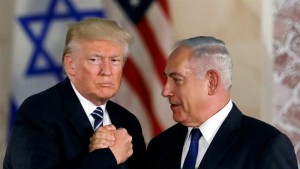
The situation now is that, whereas most previous US administrations have tried to maintain a balancing act (of sorts) of being pro-Israel but not at the expense of all other international relations, this Trump/Kushner administration has ditched all pretense and is willing to weaken US relations with most of the world (including even Europe) for the sake of Israeli interests.
Consequently, the Trump administration has allowed Netanyahu’s interests to dominate its actions, first with the Jerusalem issue and now with the JCPOA.
The result is going to be an increasingly isolated United States on the world stage.
So then, what about the Iran Nuclear Deal?
As pointed out here over a year ago, this well-planned idea of withdrawing from the Iran Deal goes right back to 2009 and the Brookings Institution paper, “Which Path to Persia? Options for a New American Strategy toward Iran.”
The Brookings Insitution, which also helped draw up the plans for the invasion of Iraq and strategies for regime-change in Syria, seemed to have laid out the strategy that appears to be being followed now.
In the document, they explain how a “superb offer” would be given to the Iranians, but should later be withdrawn from in a way that would portray Iran as having failed to honour their agreements. Reading between the lines, the idea was that a great multi-lateral agreement would be reached and would be portrayed as being highly generous to Iran, but that Iran would then be seen to betray the terms of that agreement – at which point, the US could portray this as the final straw: an ungrateful Iran, given a great deal and yet continuing to pursue its dastardly plans.
As Tony Cartolucci summarised in an article from early 2016: ‘The best way to minimize international opprobrium and maximize support (however, grudging or covert) is to strike only when there is a widespread conviction that the Iranians were given but then rejected a superb offer—one so good that only a regime determined to acquire nuclear weapons and acquire them for the wrong reasons would turn it down. Under those circumstances, the United States or Israel could portray its operations as taken in sorrow, not anger, and at least some in the international community would conclude that the Iranians “brought it on themselves” by refusing a very good deal…’
The problem is that, according to most non-Israeli and non-Trump-administration observers, the Iranians have *not* done anything to betray the agreements and haven’t been in breach of the rules.
The case could certainly be made that it wasn’t a good deal to begin with or that the Iranians were given too much leeway – but not that Iran has violated the terms of the deal.
Which means Washington and Tel-Aviv have no choice but to either invent a supposed Iranian breach or to simply talk loudly about Tehran having been betraying the ‘spirit’ of the agreement.
The former strategy appeared to be tested out just over a year ago, as reported here at the time, and involving Iranian missile tests. However, on the same day that Trump and his then National Security Adviser Michael Flynn had come out and accused Iran of flagrant violation of the JCPOA, the spokeswoman for EU Foreign Policy Chief, Federica Mogherini, had issued a public counter-statement confirming that Iran hadn’t done anything in violation of the agreements and that the ballistic missile tests had been entirely legal.
So then, if Iran hasn’t done anything to violate their agreements, the only option left is the latter: talk loudly and try to frame Iran as having violated the ‘spirit’ of the deal.
I wrote last year: ‘The accusations being leveled at Iran by President Trump and his National Security Adviser Michael Flynn concerning alleged Iranian violations of the nuclear treaty are likely manufactured to try to mislead the American public into accepting military action against Iran… It is familiar territory to anyone who remembers the propaganda/bullshit lead-in to the Iraq War.’
That point – the echo of the lead-in to the Iraq War – could prove very pertinent.
As I noted even prior to Trump’s inauguration, the Trump camp was in fact already drawing in a few key Bush-era Neo-Cons to the new administration, which indicated a continuing Neo-Con/PNAC agenda being in play.
The sacking, months ago, of Secretary of State Rex Tillerson and his being replaced by CIA man Mike Pompeo, with Neo-Con war-hawk John Bolton also coming in to replace H.R McMaster, was (as noted here at the time) entirely indicative of a contrived push towards a sought-after policy by a carefully-gathered cabal that has been gradually moved into place.
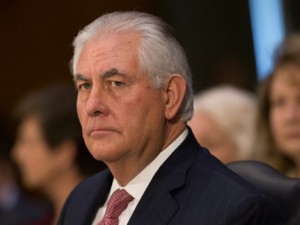
Tillerson, as noted, was a supporter of the Iran Deal. So was H.R McMaster. Meanwhile Pompeo and Bolton are both opponents of the deal and have both been long-time advocates of harsh action against the Iranian regime. Trump could not abandon the JCPOA whilst having a State Secretary (Tillerson) who was pro-JCPOA – so Tillerson had to go. And meanwhile it was well established months in advance that McMaster’s ousting was being pushed by the Zionist elements close to the administration.
For the record, John Bolton was one of the Neo-Cons found to have been guilty of fabricating ‘evidence’ against Saddam Hussein’s regime in order to justify the invasion of Iraq. This suggests that the US abandonment of the JCPOA might be designed to provoke Iran into also abandoning the agreement – and then, possibly, at some future date, some ‘intelligence’ can be produced to show that Iran presents a major and imminent WMD threat and that intervention is necessary.
The Netanyahu/Trump strategy in abandoning the JCPOA could be to strengthen the regime hardliners and extremists in Iran so that the Ayatollahs can re-assert themselves over the reformists and the younger generations (by citing US abandonment of the agreement and US threats as justification for their stranglehold on Iran), while also goading the Iranians into resuming their nuclear weapons programme.
I’m no fan of the Ayatollahs or of the regime in Iran. No Iranian I’ve ever spoken to is a fan of the Ayatollahs or the regime hardliners. It is a regime that executes almost as many citizens as Saudi Arabia, treats women almost as abjectly as the Saudi state does, a regime that hangs people for being gay, and a regime that the majority of ordinary Iranians feel no affinity for.
Iranians are generally some of the nicest, most intelligent and educated people you could meet. Iran has a very young population that doesn’t care about the ‘revolution’; and most Iranians seem also to be indifferent to the state’s various foreign adventures in Syria, Iraq and Yemen, complaining that the government is squandering the country’s finances on foreign entanglements instead of taking care of the Iranian population itself.
However, it has long been known that the Iranian Revolution and the rise of Shia/Iranian fundamentalism was an Anglo-American project in the first place.
At the very least, it is an absolute truth that the US/British overthrow of the secular Mosadegh government in the 50s (for oil reasons – why else?) was what set Iran on the path to Khomeni-ism. The highly educated and democratically-elected Mosadegh had made the mistake of nationalising Iran’s oil industry (at the expense of British control) – and was promptly overthrown in a CIA/MI6 coup.
All of that is entirely out in the open, openly admitted by subsequent American and British officials as having been “a mistake”. Everything that has happened in Iran since – including the so-called ‘Iranian Revolution’ that saw the religious fundamentalists come to power – can be regarded as a direct result of US/UK interference and regime-change.
The charges presently being levelled against Tehran include its support for terrorism, its military expansion across Syria, its involvement with Hezbollah in Lebanon, and its support for Houthi rebels in Yemen.
Strategically speaking – and from the viewpoint of Washington, Tel Aviv and Riyadh – these are valid concerns. And it seems fair to say that the geopolitical activities of Iran across the Middle East are just as malignant as Saudi or Israeli foreign meddling.

The problem is this: the military expansion of Iran across Iraq and Syria would (and could) never have happened if the US hadn’t invaded Iraq and overthrown the Iraqi state. It was the Neo-Con-led invasion in 2003 – and its subsequent Iraq policies – that handed a Sunni-dominated (but largely secular) Iraq over to Shia domination and Iranian influence.
Indeed, the entire sectarian quagmire that has erupted in the region was a sought-after policy in Israel, even referenced in Hillary Clinton’s own email exchanges with Israeli foreign-policy contacts. Indeed, had the US not overthrown Baghdad, the Shia militias would never have had the chance to go on the rampage, persecuting and slaughtering Sunnis – and therefore the Sunni backlash (which culminated with the rise of Islamic State Group in places like Mosul) would never have occured either.
All of the expansion of Iran in recent years has been entirely down to US/Israeli foriegn-policy (mis)adventures – it would be comedic, if it wasn’t so serious.
Thanks to Zionist-endorsed, Neo-Con-led misadventures of the twenty-first century, the very Public Enemy No.1 (Iran) that they’ve been complaining about all these decades is now broadly in control of Iraq and now large parts of Syria – a situation that Iranian geopolitical adventurers could never have dreamt of prior to 2003.
On the charge of supporting terrorism: while it is clear that the Iranian state has sponsored or supported acts of terrorism over several decades, the US is hardly in a position anymore to lecture anyone about supporting terrorists.
In fact, it always baffled me that the US invaded Iraq instead of Iran. Ba’athist Iraq, after all, was the longstanding enemy of the Khomeini-led Iran – and the US had in fact backed Saddam Hussein in the Iran/Iraq War of the 80s, at a time when the Ayatollah was the permanent bogeyman or Face of Evil in American consciousness. And, whereas the Iranian regime actually had supported terrorists on multiple occasions, there was never any real suggestion that the Iraqi regime had ever done so.
The one thing that should genuinely be conceded, however, is that Tehran probably is a genuine threat to Israel.
Conversely, however, Israel is very much a genuine threat to Iran. And Israel is believed to possess an enormous (and undeclared) nuclear arsenal. So, again, the whole argument falls apart – the whole point of nuclear weapons is as deterrants: two mutually-armed powers won’t attack each other because they wish to avoid the folly of mutually-assured destruction.

That’s why there’s never been a Hot War between Russia and the US. Or between nuclear Pakistan and India. You could argue that having both India and Pakistan be nuclear powers is a terrible, dangerous situation – but having only one of them be a nuclear power is arguably worse.
Israel’s nuclear weapons are by now the worst kept secret on earth. Israel is also one of the countries that has refused to sign up to the Non-Proliferation Treaty – Iran is in fact a signatory to the treaty.
If Israel and Iran were both on an equal-ish footing in terms of weapons, arguably both countries would have an assurance of not being invaded or destroyed by the other.
As it currently stands, only Israel has that security (along with the assurance that the US and other Western powers would come to its defense) – Iran has no such assurance and in fact has every reason to suspect an Israeli or US invasion, because both Israeli and American policy-makers have been openly talking about that for years now.
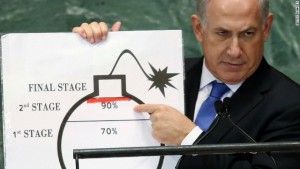
The idea that Israel – which possesses an undeclared nuclear arsenal of unknown size (and has never been made to submit to international inspections or to formally disclose the details of its nuclear programme) – should demand that Iran be barred from developing its own programme would seem, to most neutral observers, to be ludicrous.
But more so is the fact that Netanyahu’s government was then also so bitterely opposed to an international effort to peacefully get Iran to limit its nuclear programme (you know, that old-fashioned thing called diplomacy) and abide by checks and balances agreed on by multiple nations.
The question now is whether the JCPOA will survive in its current form, whether the US will force a re-negotiation or whether the Iranians will simply abandon the deal.
The EU and other JCPOA participants seem to be manuevering to keep the Iranians on-board with the programme: but one suspects Tel-Aviv and Trump Tower might actually be hoping the Iranian regime abandons the agreement and openly resumes its nuclear programme – so that the dynamics can be shifted back to what they were before all that pesky diplomacy started getting in the way.
Read more: ‘Tillerson and McMaster Have Been Ousted – Why?‘, ‘US/Iran Relations and Why We Should Be Worried‘, ‘Why Israel-Gate is Being Disguised as Russia-Gate‘, ‘Iran, Saudi Arabia, Israel & a Nuclear Middle East‘…
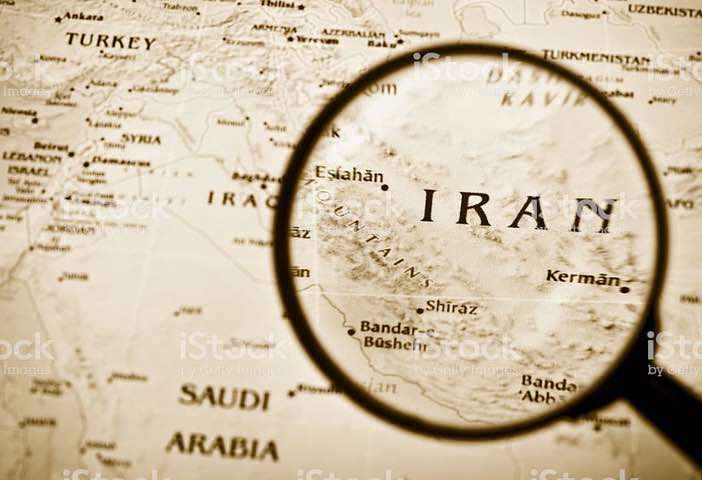
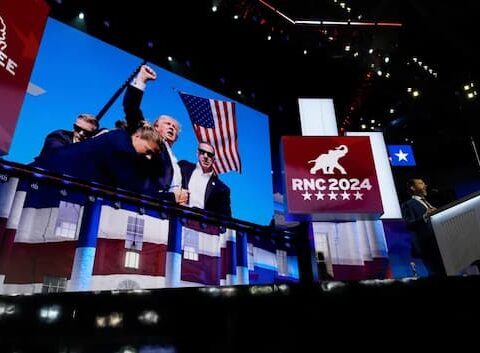
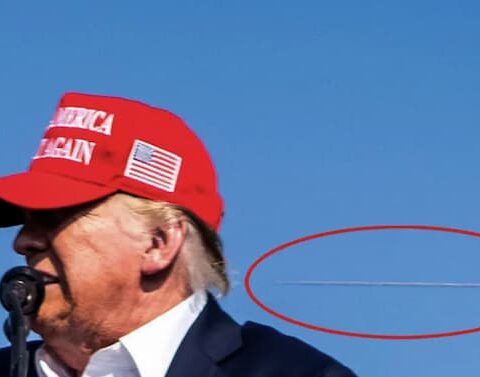

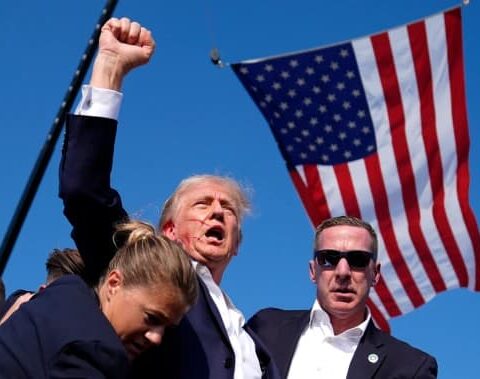
Great article with lots to think about. Thanks. But I would like to ask you about something else that is current though off-topic. I know you’re a specialist on Libya, so am interested to hear you’re thoughts on Belhaj. Obviously no-one should ever be tortured under any circumstances whatsoever and certainly Blair, Straw and the rest should now be prosecuted (but won’t be) for their part in this crime. But who is Belhaj and what’s the bigger picture?
Thanks for asking, WoC, and for reminding me about that. If I wasn’t so distracted right now with personal stuff, I would’ve been posting up material on that subject. But I’ll try to answer you here off the top of my head, from what I remember.
The Belhaj scenario is curious. By all accounts, he was tortured with British and US involvement during the ‘War on Terror’: the torture was hosted by Libyan security forces, because – at this time – Gaddafi’s people were very much cooperating with the US in the War on Terror. Gaddafi saw Al-Qaeda and the Islamists as a common enemy he shared with the US, so it made some sense. And Belhaj, from what I understand, had Islamist/Mujahideen style connections and experience. Gaddafi himself, I believe, had said Belhaj had also been a prisoner at Guantanamo Bay.
There’s a question mark as to why, after being held and tortured and obviously considered a danger, he was then let go and seemed to vanish for a few years before showing up in Libya in 2011 as a Western-backed leader of rebel groups (Islamist militias) trying to overthrow Gaddafi.
He was explicitly Western-backed and was vouched for in person by, among others, Senator John McCain who met with him on several occasions.
Belhaj appeared to then be intimately involved – at the top level – with the Al-Qaeda element of the 2011 ‘revolution’, but was put in command (with Western/CIA backing) of a major force, eventually taking control of the capital Tripoli. As commander in Tripoli, it was reported he made a small fortune from control of oil.
By 2015, he had joined the ISIS network operating in Libya.
Yet, even after all of this, Belhaj was trying to sue the British government for its complicity in his torture. The British gov probably deserves to pay through the nose for its torture activities, but to have to compensate an Al-Qaeda/ISIS commander who they themselves aided in overthrowing the very government that it originally solicited to assist in his torture… it almost makes your head explode, it’s so perverse.
On the note of Gaddafi saying Belhaj had been in Guantanamo Bay, it has long been my belief that one of the purposes of Guantanamo Bay was not to stop terrorists but to create or condition a number of terrorist proxies for future projects. There were people in Syria who also said that some of the ISIS leaders in Raqqa were people who’d been in Guantanamo Bay.
Also, on the point of Belhaj having originally sought refuge in the UK, it is known that a number of future anti-Gaddafi Libyan fighters were settled in the UK and kept here for many years, even though some of them had links to the Al-Qaeda-linked ‘Libyan Islamic Fighting Group’ (as did Belhaj). An unknown number of these were probably transported over to Libya in 2011 to create the ‘rebel’ forces. One of these, for example, was the kid who allegedly bombed the Manchester Arena last year – his family members were fighters in the 2011 uprising. Belhaj, meanwhile, was openly and fully CIA-backed when he took part in the 2011 war.
I didn’t know Belhaj was in Guantanamo, but you are certainly correct about the purpose of the place. If you look up Penny Lane you’ll find this:
https://en.wikipedia.org/wiki/Penny_Lane_(Guantanamo)
Strawberry Fields on the other hand is forever.
There you go – I’m not sure I’d even heard of Penny Lane before, but it was just a general suspicion. Very interesting.
On the matter of Belhaj and Guantanamo, I’m not certain he was held there – it was Gaddafi who said it and I assumed Gaddafi had based it on a reliable source.
On another note, I wonder how the Beatles feel about having their material tied up in CIA/Guantanamo code-names and the like? Probably the same way Rita Hayworth felt when her image was used on the a-bomb: not very happy.
Eisenhower interpreted the nationalization of Iran’s oil industry in the early 1950s as a move towards communism. (Ike never was the brightest bulb. He was applauded for victory in Europe during the war there. But, it was General Patton (who was assassinated in December, 1945) who had pulled Ike’s fat out of the fire more than once.) Obviously, the nationalization was from nationalist motives in Iran and not a move towards communism. One of the many blunders in US foreign policy in the past 100 years.
if it were not for the strangle hold the Jews have on US foreign policy (aided and abetted by brain dead Christian Zionists), it would be possible for the Iranian people and the American people if not to become friends at least to cease being enemies of each other.
The extraordinary thing about the Zionist/Christian-Zionist/Evangelical/US/Israel thing is that it’s no longer even about shared interest or mutual advantage on the American side. The US could have all kinds of positive relationships.
It’s curious to me that the US was seen in such a more positive light, say, a hundred years ago and longer, at a time when it was primarily the British and the French who were the imperialist brutes. You could see people like the Kurds, even the Arabs themselves, looking to the United States for both help and inspiration. Lawrence (of Arabia) even sought to get President Wilson’s help against his own British government and the French when it came to trying to fight for Syrian independence, as well as proper Arab indpendence and self-determination and trying to avoid the British/French Colonial carve-up of the Mid-East.
Kurdish leaders were carrying around copies of Woodrow Wilson’s literature and declarations. Later on, even Gaddafi was citing Abraham Lincoln as one of his heroes or models.
The US was regarded in a whole different light to what it is regarded as today: it was the British and French who were hated and mistrusted.
‘Tis about the reserve currency
https://financialtribune.com/articles/energy/85004/iran-russia-stop-bilateral-payments-in-us-dollars
Saddam began trading oil in Euros when the Us found reason to invade in 2003.
And Gaddafi had been trying to establish gold-backed African currency. Good point, petergrafstrm.
Reblogged this on Lolathecur's Blog Below are two very important entries from the "Jewish Encyclopedia". Read them VERY CLOSELY..
Brilliant stuff. Make me want to projectile vomit when I consider the very real threat to all of us, which is posed by Netanyahu with Trump.